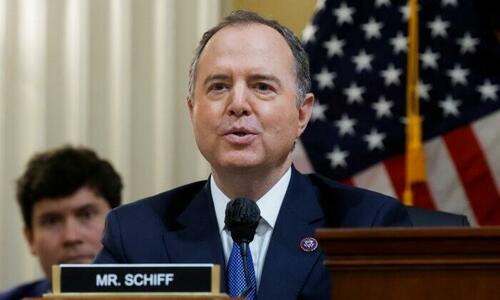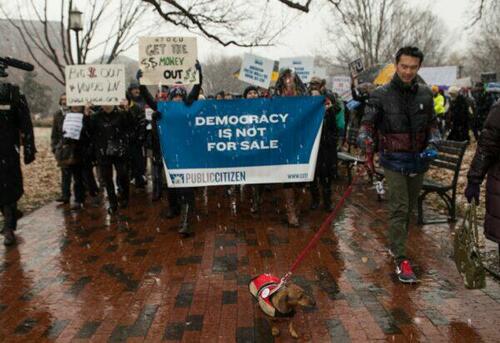
Authored by Chase Smith via The Epoch Times (emphasis ours),
Democrats in the House of Representatives have introduced a constitutional amendment to overturn the Supreme Court’s controversial Citizens United v. FEC decision made in 2010.

The court ruled 5–4 that the free speech clause of the First Amendment prohibits the government from restricting independent expenditures for political campaigns by corporations and overruled an earlier decision that banned corporations from making “electioneering communications.”
Rep. Adam Schiff (D-Calif). said in a press release he and Democrat colleagues introduced the “Democracy For All Amendment” to “overturn legal precedents that have allowed unrestrained campaign spending and dark money to corrupt American democracy.” He has introduced the constitutional amendment every year since 2013, according to the release.
“The flow of unrestricted corporate and dark money into our elections has dangerously eroded the American people’s faith in our democracy, and in our government’s ability to deliver for them and their families,” Schiff said in a press release. “Citizens United was one of the most egregious enablers of special interest money, but it was only the latest in a long line of Supreme Court cases that opened the floodgates. To truly rein in dark money, we must amend our Constitution.”
Schiff said the amendment would close “legal loopholes” that he said allows “wealthy megadonors, corporations, and special interest groups” to exploit the political system.
Citizens United v. Federal Election Commission
Schiff said the move comes before the 13th anniversary of the decision on Jan. 21, which the Associated Press said came from a “bitterly divided U.S. Supreme Court.”
The AP said the decision “vastly increased the power of big business and labor unions to influence government decisions by freeing them to spend their millions directly to sway elections for president and Congress.”
The Federal Election Campaign Act prohibited corporations and labor unions from using general funds to make election communications or speech that expressly advocated for a candidate in a federal election, including broadcasts, cable or satellite communication that is publicly distributed within 30 days of a primary or 60 days of a general election, according to the FEC.

In January 2008, Citizens United, a non-profit organization, released a film about then-Senator Hillary Clinton, prior to the Democratic Party’s 2008 primary elections.
The group wanted to pay cable companies to make the film available for free through video-on-demand services. It planned to make the film available within 30 days of the primaries, but feared it would be covered by the Act’s ban, according to the FEC, which could have subjected them to civil and criminal penalties.
The group sought declaratory and injunctive relief against the FEC arguing the Act was unconstitutional. The District Court denied the preliminary injunction and granted the Commission’s motion for summary judgment.
The Supreme Court noted jurisdiction and found that they were “required to consider the facial validity” of the Act’s ban in regard to freedom of speech.
The Court held the Act was a ban on speech and “political speech must prevail against laws that would suppress it, whether by design or inadvertence.”
It held disclaimer and disclosure requirements are “constitutional as applied to both the broadcast of the film and the ads promoting the film itself, since the ads qualify as electioneering communications.”
Read more here...
Authored by Chase Smith via The Epoch Times (emphasis ours),
Democrats in the House of Representatives have introduced a constitutional amendment to overturn the Supreme Court’s controversial Citizens United v. FEC decision made in 2010.

The court ruled 5–4 that the free speech clause of the First Amendment prohibits the government from restricting independent expenditures for political campaigns by corporations and overruled an earlier decision that banned corporations from making “electioneering communications.”
Rep. Adam Schiff (D-Calif). said in a press release he and Democrat colleagues introduced the “Democracy For All Amendment” to “overturn legal precedents that have allowed unrestrained campaign spending and dark money to corrupt American democracy.” He has introduced the constitutional amendment every year since 2013, according to the release.
“The flow of unrestricted corporate and dark money into our elections has dangerously eroded the American people’s faith in our democracy, and in our government’s ability to deliver for them and their families,” Schiff said in a press release. “Citizens United was one of the most egregious enablers of special interest money, but it was only the latest in a long line of Supreme Court cases that opened the floodgates. To truly rein in dark money, we must amend our Constitution.”
Schiff said the amendment would close “legal loopholes” that he said allows “wealthy megadonors, corporations, and special interest groups” to exploit the political system.
Citizens United v. Federal Election Commission
Schiff said the move comes before the 13th anniversary of the decision on Jan. 21, which the Associated Press said came from a “bitterly divided U.S. Supreme Court.”
The AP said the decision “vastly increased the power of big business and labor unions to influence government decisions by freeing them to spend their millions directly to sway elections for president and Congress.”
The Federal Election Campaign Act prohibited corporations and labor unions from using general funds to make election communications or speech that expressly advocated for a candidate in a federal election, including broadcasts, cable or satellite communication that is publicly distributed within 30 days of a primary or 60 days of a general election, according to the FEC.

In January 2008, Citizens United, a non-profit organization, released a film about then-Senator Hillary Clinton, prior to the Democratic Party’s 2008 primary elections.
The group wanted to pay cable companies to make the film available for free through video-on-demand services. It planned to make the film available within 30 days of the primaries, but feared it would be covered by the Act’s ban, according to the FEC, which could have subjected them to civil and criminal penalties.
The group sought declaratory and injunctive relief against the FEC arguing the Act was unconstitutional. The District Court denied the preliminary injunction and granted the Commission’s motion for summary judgment.
The Supreme Court noted jurisdiction and found that they were “required to consider the facial validity” of the Act’s ban in regard to freedom of speech.
The Court held the Act was a ban on speech and “political speech must prevail against laws that would suppress it, whether by design or inadvertence.”
It held disclaimer and disclosure requirements are “constitutional as applied to both the broadcast of the film and the ads promoting the film itself, since the ads qualify as electioneering communications.”
Read more here…
Loading…







